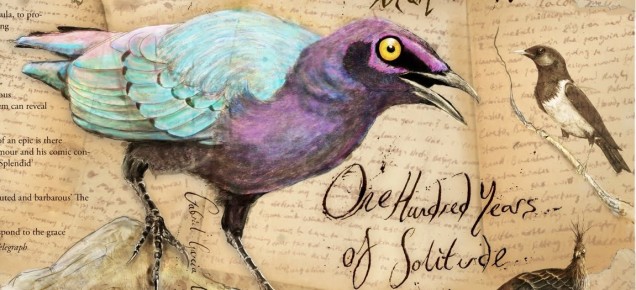My dear friend Natalya Delgado Chegwin has in my view a very interesting take on the literary legacy of García Márquez, my favourite author who recently passed away. In her view, “I commend whoever has read his novels, but do not recommend them”. I asked her to expand her (shocking!) argument for my blog. Enjoy her witty and insightful text below!

I want to believe I have some authority to talk about Gabriel García Márquez: I am Colombian, just like he was; I come from the Caribbean coast, from Barranquilla, where he spent so many of his best years; he won the Nobel Prize in Literature in 1982, and I was born the next year; but mostly, I spent one year researching him and his work to compose my Bachelor thesis.
Thus, I have read García Márquez both as a scholar and as a “normal” person; that is like one who read literature to understand society as well as one who reads literature to jump into a new world. And the world that García Márquez presents is nothing short of magical – it is not for nothing that he is credited with the creation of magical realism. But instead of my diverging into whether or not he did, actually, create magical realism, let me jump into the true point of this post. You would expect for me, a Colombian literary scholar with some authority to talk about García Márquez, to be the most avid supporter of all of his writings. But I’m not.
I don’t think everyone should read García Márquez, especially not One Hundred Years of Solitude. The novel is not only incredibly long (spoiler alert: it spans 100 years!) but is plagued with hundreds of names (neither the use of the word “plague” nor the seeming hyperbole of the names is coincidental…). His last novel, Memoria de mis putas tristes (Memories of my melancholy whores), 2005, is an apparent apologetic to prostitution with a shorter time span and fewer characters, but not for that a better or worse read than his masterpiece.
I, too, fell in love with his Of love and other demons, considering the (his)story of Sierva Maria the best and most profoundly pure love story I had ever read. That was 15 years ago. I re-read the novel recently and noticed that what had once allured me no longer piqued my interest. You see, his novels are filled with stories that do not grow with you; they are not novels that are meant to be read more than once. Written beautifully, yes, with a masterful use of vocabulary, both colloquial and with a yesteryear flare, albeit stories that don’t change. So no, not everyone should stop what they’re doing to run to their nearest bookstore to purchase one of his novels. His novels are an acquired taste, and a difficult one to acquire. I commend whoever has read his novels, but do not recommend them.
Not the novels, at least.
Because his short stories, his journalistic reports and his essays are genius. Those are something everyone must read. You see, García Márquez was a journalist at heart, that was his dream. He just happened to discover that he was a good novelist, too, and when he won the Nobel Prize he kind of relinquished journalism for long and prosper career as a novelist. Do you want to know the real García Márquez? Read The Story of a Shipwrecked Sailor (1970), News of a Kidnapping (1996), Living to Tell the Tale (2002), Eyes of a Blue Dog (1947) or Big Mama’s Funeral (1962). The order is based on my favorites. The last two are two of his short story collections; Living to tell the tale is his autobiography, the brilliant tale of his amazing life, which one only enjoys more after having read most of his work. The first two, as their titles already hint, are journalistic reports, so cleverly narrated that you might just feel as if it were you surrounded by sharks or guerrilla. You see, García Márquez’s genius lies in the fact that he is able to completely spoil the climax of the story in the title, and you still are fascinated with the sequence of events.
In his Chronicle of a death foretold (1981), you will learn within the first three sentences that Santiago Nasar is shot in the morning by two Vicario Brothers. And in spite of having read this now, here, I promise I have not spoiled a thing. Therein lies his skill – you will want to continue reading.
So don’t jump on the bandwagon and try to tackle his impossible Buendía family tree. That is, unfortunately, not for everyone. Rather look through his titles and see which one interest you – I can guarantee you will fall in love. And then maybe, just maybe, you will want to know about Aureliano and the pig’s tail…
Text by Natalya Delgado Chegwin, illustration borrowed here.

1 Comment
Really interesting post. Though I also love the novels, his journalism is brilliant – l loved news on a kidnapping especially – and perhaps not as widely known.